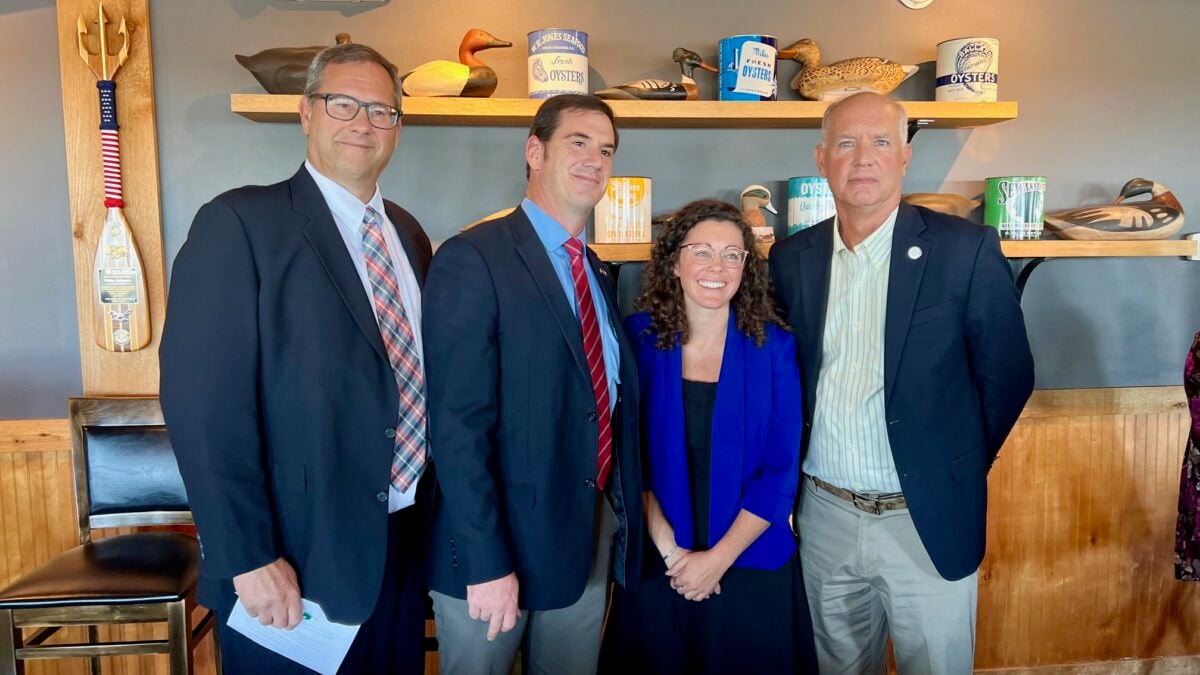
Pictured: Jay Abella, ESVA Chamber Executive Director Robert Sabbatini, Liz Richardson, Delegate Rob Bloxom.
The ESVA Chamber of Commerce held a candidates forum with Delegate Rob Bloxom(R) and challenger Liz Richardson(D) on Thursday afternoon at the Island House Restaurant. The full house event was moderated by Jay Abella, a financial advisor and Chamber Board member.
On Virginia’s right-to-work law, Bloxom offered unequivocal support, arguing it underpins the state’s long-standing pro-business rankings. Richardson said she may have an unpopular opinion, but she understood how small businesses benefit from right-to-work while noting unions can be vital.
On the subject of cuts to federal funding, Bloxom said basic Medicaid eligibility was not cut and warned of potential state costs tied to SNAP administration and error rates. Richardson said core programs such as Medicaid, SNAP, and disaster preparedness remain “super important,” urged creative reprioritization in the state budget, and called for closing select tax preferences (such as for data centers) to protect services.
Both candidates agreed localities should retain control over zoning processes. Richardson highlighted housing affordability as a top concern for younger residents. Bloxom pointed to existing incentives (including state low-income housing tax credits) and cautioned that density trade-offs must be decided locally.
Minimum wage divided the two. Richardson backed further increases toward a living wage, citing rising costs. Bloxom opposed additional state mandates, arguing market pay already exceeds minimums for many local jobs and warned of unintended consequences for youth looking for their first jobs and farm work.
Education and workforce pipelines drew contrasting emphases. Bloxom touted sustained teacher pay bumps, “grow-your-own” teacher strategies, and Governor Youngkin’s new Aerospace Academy pathway linking local schools to ESCC and ODU. Richardson said she worried local students would not be competitive for Aerospace jobs given local test scores and pressed for stronger literacy, math, and trades training so graduates can step into high-paying local careers not easily displaced by AI.
On taxes, both were skeptical of eliminating the personal property (car) tax without a dollar-for-dollar replacement revenue source, noting counties rely on that funding. Both also opposed a school voucher program.
When asked about natural gas, Bloxom pointed out he has been working for several years to advance a natural gas pipeline to serve Northern Accomack industry, noting ongoing planning and permitting work, while saying any southward expansion still needs more customers to work. Richardson acknowledged the industrial need in northern Accomack, but warned against shifting corporate infrastructure costs to taxpayers and stressed land, water, and public-health safeguards if expansions are pursued. On the Virginia Clean Economy Act and large-scale battery storage, Bloxom criticized mandates and cost pass-throughs to ratepayers, urging an energy “all-of-the-above” approach with firm baseload. Richardson backed continued clean-energy build-out as a long-term affordability and resilience strategy. She supported rejoining the Regional Greenhouse Gas Initiative; Bloxom opposed RGGI as a de facto tax that raises bills.
Their positions also diverged on potential constitutional amendments. Richardson said she would vote yes on three measures which will be on the ballot this fall in Virginia, protecting abortion rights (including contraception and IVF), same-sex marriage, and restoration of voting rights after completion of sentences. Bloxom said he supports protecting same-sex marriage but would vote no on the abortion amendment, saying the amendment would enshrine partial birth abortions into law. He also raised concerns about automatic rights restoration before restitution to victims of crimes and court costs are resolved.
Paid family and medical leave drew mixed views. Richardson favored moving toward a workable model that balances costs for small employers with family needs, citing her experience in care settings; Bloxom opposed a statewide program administered through the VEC, warning of payroll costs and administrative burdens.
Asked how they would represent all constituents, Richardson emphasized active listening and bridge-building across the district’s rural and suburban communities. Bloxom pointed to a record of cross-party work and open-door constituent service, noting his experience as a budget conferee gives the Shore a direct voice in state spending talks.
In brief closing remarks, Bloxom argued his seniority and budget seat deliver concrete wins for the Shore. Richardson said her background in education, agriculture, health care, and financial crisis mitigation positions her to tackle affordability and opportunity for both young families and seniors, and to keep the Shore livable for future generations.














